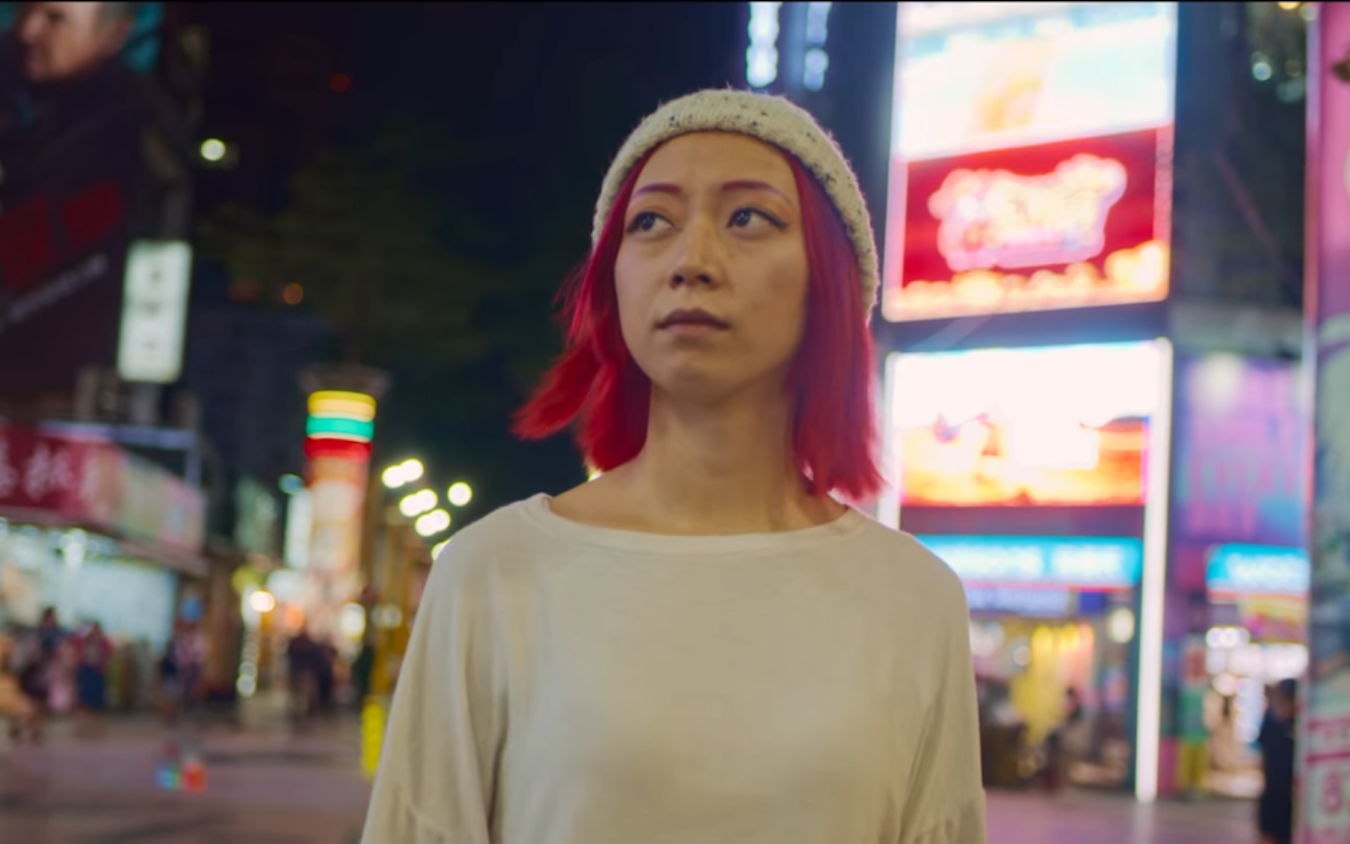by Kevin Hsu
語言:
English
Photo Credit: Netflix
This interview was originally published by Ketagalan Media and is reprinted here with permission.
From buzzy soap operas and historical dramas to award-winning films, programming centered on Taiwan continues to proliferate across Netflix. The latest entry: an episode of “Midnight Asia,” a six-part docuseries by InFocus Asia celebrating the diverse nightlife found in Asian metropolises, such as Seoul, Mumbai, Tokyo, Manila and Bangkok. Episode 5 stars the incandescent city of “Taipei, Taiwan” after dark.
Taiwanese American Darice Dan-huei Chang (張芯甯 or Dan Dan 丹丹), is one of the episode’s guides, which also includes a mixologist, a DJ, and an oyster omelet (蚵仔煎) vendor. In this interview, the Taipei resident shares with us performing in the small but growing community of drag kings, and how they bring Netflix audiences along for the ride in nocturnal Taipei. Chang, who identifies as “non-binary/post-gender” and uses the pronouns “they/them,” is also a contributor to Ketagalan Media. (Find them at @darice_dandan and their drag king persona at @dandan.demolition).
Kevin: Tell me about where you’re from and what brought you to Taiwan?
Darice: I’m originally from Minnesota, where I was born and raised. I attended university there, and then worked in Los Angeles. My parents are from Taiwan, so I had visited a few times while growing up, and also attended youth camps during high school and college. After graduation, I originally intended to spend a gap year in Japan—but that was the year of the earthquake [2011 Tohoku earthquake and tsunami] so I came to Taiwan instead. I loved it and kept looking for opportunities to return. In the fall of 2015, I moved here permanently.
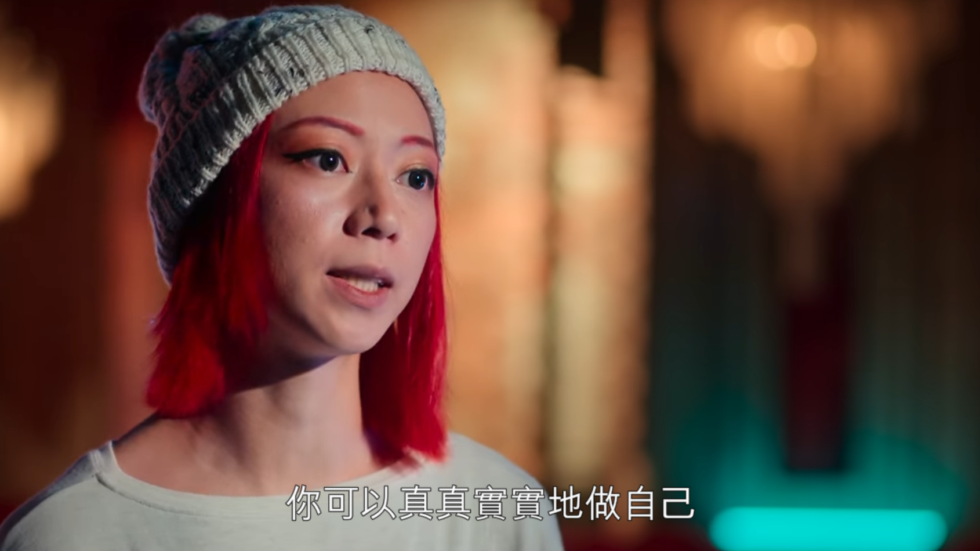
In Netflix docu-series Midnight Asia, drag king performer Darice Chang explains that in Taipei, “you can really be yourself.” The episode features diverse facets of the city’s nightlife. Photo credit: Netflix
K: You mentioned youth camps. What are those?
D: I did not do Love Boat—my younger sister and cousin did that, but not me. I attended a summer meditation camp hosted by a Chinese-language school. We practiced qigong and meditated every day, all in Mandarin. It was very intense, helping me connect with what it means to be ‘secularly spiritual’ in Taiwan. That experience also let me make local Taiwanese friends, so when I moved here, I could plug into a social network. I still volunteer with that camp and attend classes sometimes.
K: Why did you move to Taiwan full-time in 2015?
D: While living in Los Angeles, I was selected as Miss Taiwanese American for 2014-2015. In that process, I learned how being Taiwanese American is different from being generally Chinese American. I was raised as the latter, because our family is deep Blue. During the pageant, the Formosan Association for Public Affairs (FAPA) sent a representative, who shared that Taiwan was not allowed to be part of the World Health Organization (WHO). This had consequences during the SARS epidemic, when we couldn’t get information fast enough, as China claimed it represented Taiwan at the UN. I was motivated to get involved with the FAPA Young Professionals Group, to get trained and better understand Taiwan’s situation.
I listen to metal, and Chthonic is the only band from Taiwan that people really know about. It turns out Freddy Lim was the lead vocalist of the group. I really liked their lyric, “Let me stand up like a Taiwanese!” from the song “Supreme Pain for the Tyrant” so I performed that song as a contestant for the Taiwanese American Heritage Festival. Later that year, Freddy spoke at the Taiwanese American Conferences – West Coast (美國西部台灣人夏令會), which I attended with a group of friends. Virtually all of the attendees were born in Taiwan, but had immigrated to the United States, and were very supportive of the democracy movement. Freddy talked about running for a seat in the legislature with the New Power Party (NPP). He said they needed volunteers to canvas the district, including young people, to reach out to different demographic groups. At the time, my career at an LA-based Japanese company felt like it was plateauing, so I decided to do something interesting and go back to Taiwan to help.
K: You literally left the United States, and went to Taiwan to canvas for Freddy Lim?
D: Foreigners aren’t allowed to participate in political life, but I have dual citizenship, so I’m lucky that I qualify as a voter. When I was younger, my mom told me, “Never get involved in politics!” But then she got us KMT shirts and made us wear them. She was really upset to discover that I backed the NPP.
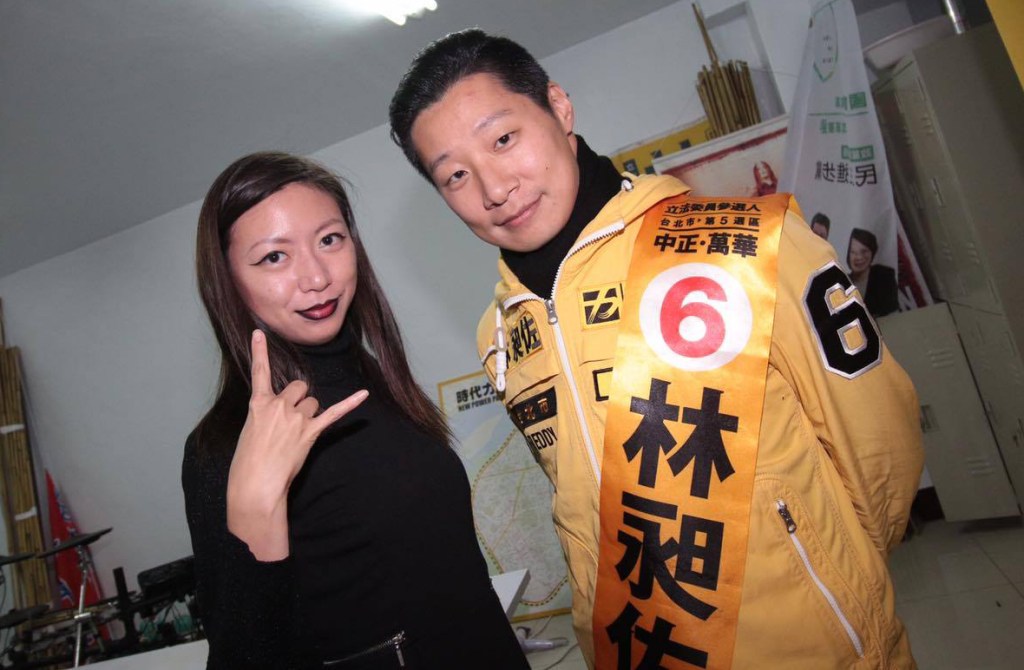
Darice Chang with Freddy Lim on the campaign trail. Lim is now a legislator, representing the New Power Party, in Taiwan’s parliament. Photo credit: SANADA
We canvassed at community markets and underserved areas of Taipei. It was a very eye-opening experience: you go to so many areas that you might not go to if you’re just living in Taipei. The campaign also hired me to help translate and interpret at international press conferences, because it’s something I had previously done professionally.
K: So you got to know political life, but how did you get acquainted with nightlife in Taiwan?
D: That happened a couple of years later. The American elections had taken place in the fall of 2016, and Trump got elected. I thought to myself, “Taiwan looks really good right now” and decided to stay. That’s when I started writing for Ketagalan Media and got involved with the Women’s March as well. I participated in the production of an “ear film,” an audiobook with narration and 360-degree surround sound. As I got more settled, I started exploring the underground art scene and indie music scene. What got me into nightlife was underground electronica—and then that got me into drag.
K: What does the phrase “drag” mean to you, and what does it look like?
D: I was dealing with my gender identity, so I was interested in queer spaces, queer art. There were events like Work, Cum, Lezs Party and Blush around Taipei, happening at venues like the B1 club, where the DJs played European electronic music. Seeing people in drag, and seeing non-binary individuals, helped me to find a community. Plus, in the US, there is not a lot of queer Asian representation, so this was very affirming. I had also done cosplay and participated in the goth scene back in Los Angeles, and I found this was the only scene in Taiwan’s nightlife that had a similar vibe–specifically both electronica and queer.
K: Do people expect “queer” and “electronica” to intersect?
D: Drag coming out of Europe has been tied to the electronica scene. In Taiwan, Spectrum Formosis is a three-day queer electronica festival. It was originally an electronica festival, but now they are trying to center it on queerness, too. The drag queen Popcorn (@taipei.popcorn) invited me to Spectrum Formosis, and I found the queer community there very supportive and loving.
I currently identify as gender non-conforming, referring to someone that does not fall within the male-female gender binary. People experience gender differently, and I am a non-binary person. At some point, I observed drag kings showing up to events—and that’s when I realized I could not only enjoy drag shows, but could potentially perform, too. Through drag, I could appear as a man.
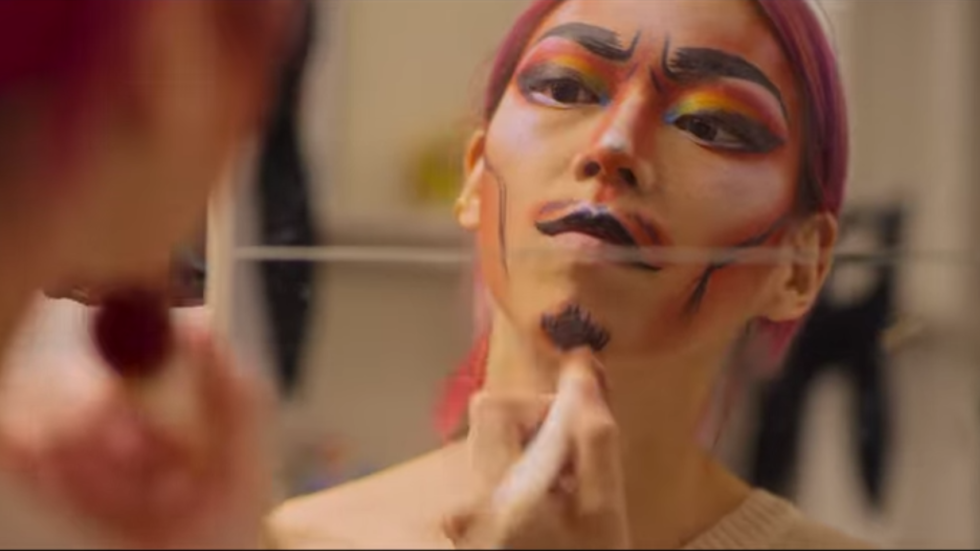
Chang identifies as non-binary and queer-feminine, but in drag takes on a different persona. Photo credit: Netflix
K: When did you start performing as a Drag King?
D: That happened more slowly. I only started a couple years ago, in 2019, and there’s a large community aspect to it. Skye Grimm (@sawyer_darling) was one of the earlier AFAB “assigned female at birth” drag performers in Taipei. They hosted a Drag King Workshop, and a bunch of AFAB people and I showed up. It was fun to learn, and we soon started having more Drag King salons. Then I think we started performing at Café Dalida [part of the cluster of LGBT establishments at Ximenting’s Red House] and at Dog Days in Drag, an annual benefit to raise money for animal rescue.
K: Why did you decide to do this Netflix documentary?
D: The people who work as foreign correspondents in Taipei all know each other. The local producer for the show, Betty Wang, got in touch with me to ask about nightlife. I said, “All I know are Drag and Electronica.” Then she came back and said, “Hey, I heard you’re a drag king!” I had only been performing for about half a year, but I guess there aren’t that many drag kings. She wanted to know my story.
Another motivation is that there are so many venues for gay men right now, but there’s a real need for gender-diverse queer spaces. Cis-gender, homosexual men have plenty of venues to choose from, but we can also cater to other parts of the LGBTQ rainbow.
I helped to build the Magic Unicorn float and danced on it during Taipei Pride 2020. That Pride experience cemented my observation that the gay/queer community in Taiwan is dominated by cis-homo men. Guys are loud—they’re in front of the camera, and they have more resources. The only people you normally see on floats are go-go boys and drag queens. You don’t often see lesbians or drag kings. When Netflix asked, I agreed to do it, because we need to get more exposure for our community.
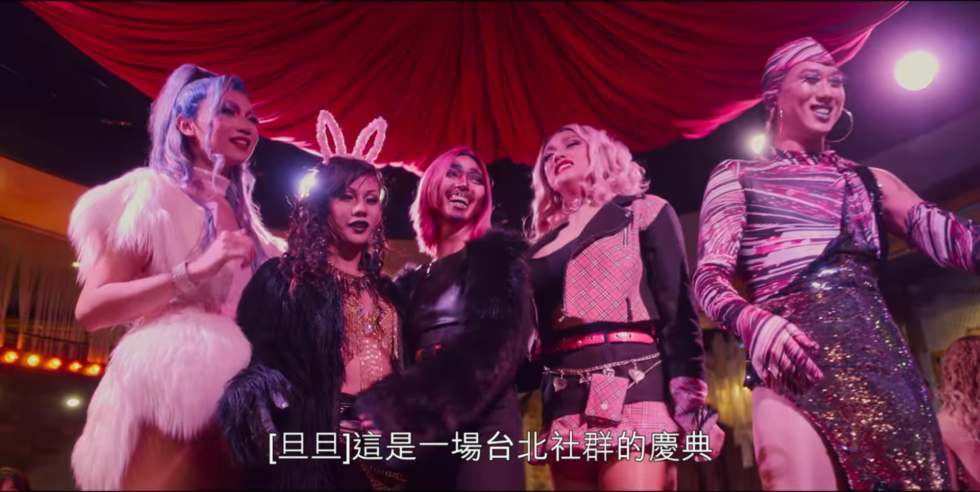
Dan Dan Demolition, a drag king, shares the stage with drag queens at a performance in Taipei. Photo credit: Netflix
K: In this documentary, what element of nightlife did you want to showcase or tell a story about?
D: I wanted to feature other aspects of LGBT life, not just cis-gender men. You can’t ever have one person represent a whole community, but I wanted to show my story as part of that spectrum. I am non-binary, AFAB, and queer. I wanted to show that you can be queer while looking the way I do.
Furthermore, there are stereotypes about what non-binary individuals look like. People assume you have to be androgynous and have short hair. At this stage in my life [in 2022], I am very feminine presenting. I consider myself “queer femme,” though I’ve also been through phases where I am very masculine presenting. A lot of people just assume I am a woman, so there’s a lot of misgendering going on, which erases my non-binary identity.
I want other people to see that you can look like me, and still be queer and non-binary!
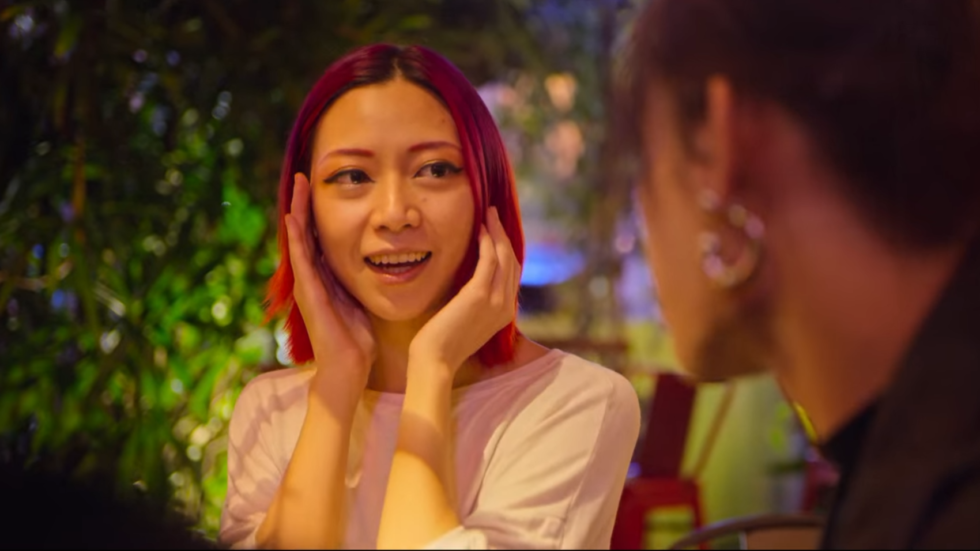
Chang chats with friends in a scene from Midnight Asia. Photo credit: Netflix
K: What was the process of filming like? How long did it take, and were there any challenges?
D: We filmed on two different days, though before that, we had pre-interviews with the series producer. The drag queen Yolanda (@jiyao_aka_yolanda) is my drag guardian, and she was part of those interviews, too. The producers asked us our story, then they figured out how to tell our story through film.
The first day we filmed for 10 hours, mostly interviews, then picking out costumes, and finally talking to friends at Red House. Then we spent the next week making our costumes. After that, filming the actual drag performance was another several hours, including prep time.
K: What was your favorite part of filming?
D: The producers told me at the very last minute, “Hey, we want a couple of your friends to be part of the filming.” I was thinking, “My friends are very busy people. Who can make it on such short notice?” But my friend Ivan (@ivanchliu), an artist, scientist and Assistant Professor at National Yang Ming Chiao Tung University actually said yes, and accompanied me for the Dalida scene in the documentary. He wore a jacket by KUAN, who founded the social enterprise Story Wear, a zero-waste fashion company that employs stay-at-home moms. It embodies everything I love about Taiwan.
My friend Shannon (@shannily), who attended the Fashion Institute of Design & Merchandising, made costumes for me. These were all upcycled from old clothing and reworked into outfits for the drag show. It was awesome to have my friends come through for me, even at the last minute. And of course, I enjoyed talking with people in the queer and drag communities during filming—everyone is lovely.
Trailer for the documentary
K: As a Taiwanese American who is now living in Taiwan, how do you feel about Midnight Asia coming out?
D: I am really excited! Taiwan can always use more good press, and this is going to be a gorgeous exposé on what’s going on with Taiwan at night. I’m excited for Taiwan to get more airtime, and the series is on Netflix, so it will be in so many different places.
I also hope viewers realize we have nightlife here! Many people think Taipei doesn’t have much nightlife compared to other international cities, but our bar culture is fantastic. A lot of people know about night markets, but there is also a high-end cocktail scene. Coming from LA and having a background in the food and beverage industry, I feel spoiled by what is available in Taipei. It’s a scene I really enjoy.
The DRAG KINGS crew in Taipei is also growing rapidly, and this lets people find out about that. I am currently putting together a Global Digital Drag Show centering BIPOC [Black and Indigenous people of color] voices on “Queer Eco Futures” for February.
K: What do you hope the rest of the world can learn about Taipei, or Taiwan more generally, through this documentary?
D: Taiwan is truly diverse, tolerant and multicultural. Through this documentary, we’re showcasing that. There is a huge diversity of experiences of what it means to be Taiwanese, and I feel blessed to be part of that.


